|
Digital technologies, while enhancing productivity and communication, also contribute to significant workplace stress. Our recently published study addresses the fragmentation in existing models of digital hindrance stressors by proposing a unified hierarchical model tailored to contemporary digital work environments. The research synthesizes various technostress frameworks and employs a mixed methods approach, including a qualitative pre-study and extensive surveys with over 5,800 participants, to identify and validate twelve first-order and five second-order stressors. The new model offers both detailed and streamlined measurement tools, enhancing its applicability in diverse organizational contexts.
For practitioners and policymakers, this study provides a comprehensive framework to assess and mitigate the adverse impacts of digital stressors. The unified model allows organizations to understand specific stressors their employees face and implement targeted interventions to improve well-being and productivity. By utilizing this model, occupational health professionals can better address the psychological and physical health implications of technostress. Moreover, the findings offer actionable insights for designing digital work environments that minimize stress and foster a healthier, more productive workforce. This research bridges the gap between theoretical technostress models and practical applications, guiding effective strategies for managing digital workplace stress. Please read more about our research in our latest paper published in Information Systems Research. The successful implementation of business strategies remains one of the biggest challenges for companies. Strategy implementation processes are often too static and long-term planning is not always compatible with the dynamic corporate environment. In particular, the rapid progress of digital technologies confronts companies with the risk of losing touch with the market. In order to meet this challenge, a strategy implementation process was developed as part of a case study and evaluated with a German automotive supplier. This process is designed to help companies harmonize business strategies with emerging digital transformation initiatives and implement them in an integrative manner in order to keep pace with dynamic market conditions. Please read more on this topic in our (German) paper "Harmonisierung und integrative Implementierung traditioneller Geschäftsstrategien mit digitalen Transformationsinitiativen" recently published in Wirtschaftsinformatik & Management.
Intelligent agents may become our co-workers. As intelligent agents powered by agentic information systems are acquiring more capabilities, humans consider teaming up with them in ever more circumstances. However, research and practice still face major uncertainties and difficulties when implementing intelligent agents into work systems together with humans.
We addressed the lack of guidance on how to design work systems in which human and intelligent agents can collaborate, by investigating the central aspects that describe the collaboration of human and intelligent agents in work systems. We did so by building on a literature review on human-robot interaction and taking the work system perspective. This results in two contributions. First, we identified 16 important design dimensions of collaboration between human and intelligent agents. Second, we assembled these dimensions into a task-related framework that highlights specific design parameters and important considerations when designing work systems where human and intelligent agents collaborate. I am happy that our paper "Teaming Up With Intelligent Agents – A Work System Perspective on the Collaboration With Intelligent Agents" has been accepted for presentation at the 32nd European Conference on Information Systems (ECIS 2024). The conference will take place from June 13 to 19 in Paphos, Cyprus. The business value of data-driven insight initiatives (DDII), such as business intelligence or big data analytics, has been primarily studied from a variance perspective, often neglecting the process perspective. Although the variance perspective is well established and identifies key factors or capabilities critical to business value creation, the process perspective can provide explanations of how capabilities lead to business value. For organizations to fully understand how these capabilities impact the value-creation process and to prevent the failure of DDII, there is a need for prescriptive knowledge that encompasses both perspectives.
Through a systematic literature review, our research work highlights the variance-focused conceptual landscape of DDII business value research. Based on these findings, along with an analysis of the (process-) explanations for this relationship, we introduce a hybrid explanation model that integrates the insights from both perspectives, thus providing a more comprehensive understanding of the mechanisms by which DDII capabilities lead to business value. I am happy that our paper "From Data to Value: Revisiting Business Value Research in the Context of Data Insights-Driven Initiatives" has been accepted for presentation at the 32nd European Conference on Information Systems (ECIS 2024). The conference will take place from June 13 to 19 in Paphos, Cyprus. In the current issue of DUZ, I wrote about the impact of artificial intelligence on work with a particular focus on the implications for universities and science (in German).
Artificial intelligence (AI) applications pave the way for innovations in the healthcare (HC) industry. However, their adoption in HC organizations is still nascent as organizations often face a fragmented and incomplete picture of how they can capture the value of AI applications on a managerial level. To overcome adoption hurdles, HC organizations would benefit from understanding how they can capture AI applications’ potential.
We conducted a comprehensive systematic literature review and 11 semi-structured expert interviews to identify, systematize, and describe 15 business objectives that translate into six value propositions of AI applications in HC. Our results demonstrate that AI applications can have several business objectives converging into risk-reduced patient care, advanced patient care, self-management, process acceleration, resource optimization, and knowledge discovery. We contribute to the literature by extending research on value creation mechanisms of AI to the HC context and guiding HC organizations in evaluating their AI applications or those of the competition on a managerial level, to assess AI investment decisions, and to align their AI application portfolio towards an overarching strategy. Please read more about our research in our latest paper published in BMC Health Services Research. The widespread use of Artificial Intelligence (AI) in various areas of professional and private life makes us thoroughly re-evaluate and update the competencies university students should acquire. This whitepaper focuses on what these changes mean for higher education, helping individuals responsible for curricular and extracurricular courses at higher education institutions integrate new competencies.
Competencies are a combination of skills, knowledge, and attitudes that enables a person to perform a task or an activity successfully in a specific context. Basic competencies such as literacy and numeracy are integral to a wide array of professions and in various aspects of daily life. Furthermore, this discourse extends to advanced competencies, such as training machine learning (ML) models or preparing annual financial statements, which are indispensable for certain specialized professions or tasks. Especially the advent of Generative AI (GenAI) is catalyzing a transformative shift in the landscape of competencies. While established overarching competency areas such as literacy or numeracy are likely to remain relevant, their significance is changing, with some areas increasing and others decreasing in relevance. At a more detailed level, specific knowledge areas, skills, and attitudes are becoming outdated as new ones emerge in response to evolving technological demands. In particular, new competency areas specifically related to AI, such as AI Management or AI Innovation, are emerging. In summary, the competency profiles required for success in the business world, society, and life are undergoing rapid changes, mirroring the swift pace of technological advancements in AI. Consequently, higher education institutions such as universities should reconsider their pedagogical approaches, considering a future deeply interwoven with AI technologies. Students, in turn, should plan their educational trajectories to align with this AI-shaped future. Given the constrained scope and duration of higher education degree programs, it is important to utilize these resources in a manner that is both goal-oriented and efficient. As the objectives regarding competencies evolve, there is a corresponding necessity for transforming both teaching offers and learning opportunities. Our recently published whitepaper motivates the topic and emphasizes the relevance of AI as a general-purpose technology in sections 1 and 2. Readers familiar with AI might want to skip these preliminaries. Section 3 details basic and advanced competencies, shifting relevance, and novelties due to AI. Section 4 poses nine key questions for higher education institutions to answer regarding their current and future teaching with the omnipresence of AI. Section 5 presents examples of AI competency models and their integration into teaching and learning from three different universities. Sections 3 to 5 are the core of this whitepaper and shall inform and inspire the debate about AI competencies in higher education. Section 6 is a brief conclusion. With growing awareness of sustainability and convenience expectations, customers are increasingly demanding integrated and seamless mobility in the form of mobility-as-a-service (MaaS). However, as centralized MaaS platforms have thus far failed to integrate a critical share of mobility service providers (MSPs), travelers lack opportunities to efficiently combine the various mobility services required for seamless end-to-end itinerary coverage. Particularly, MSPs often refuse to collaborate by devolving control over customer interfaces or sensitive data owing to threats of market power concentration.
While alternative blockchain-based approaches aim to provide equal market access, they cannot sufficiently align competing business goals and face substantial problems resulting from the replicated processing of sensitive data. Both researchers and practitioners have recently suggested decentralized digital identity management enabled by digital wallets as a promising mechanism to exchange verifiable identity attributes while mitigating problems related to data aggregation. Following a design science research approach, we explored how digital wallets can address the shortcomings of existing approaches to MaaS. We contribute a novel IS architecture and principles for a design at the nexus of centralized and decentralized solutions to mitigate tensions between cooperation and competition. Further, our findings indicate that when building decentralized solutions, one should also consider components beyond blockchain and smart contracts. Please read more about our research in our latest paper published in Business & Information Systems Engineering. AI applications hold great potential for improving healthcare. However, successfully operating AI is a complex endeavor requiring organizations to establish adequate management approaches. Managing AI applications requires functioning information exchange between a diverse set of stakeholders. Lacking information processing among stakeholders increases task uncertainty, hampering the operation of AI applications. Existing research lacks an understanding of holistic AI management approaches.
To shed light on AI management in healthcare, we conducted a multi-perspective literature analysis followed by an interview study. Based on the organizational information processing theory, we investigated AI management in healthcare from an organizational perspective. As a result, we developed the AI application management model (AIAMA) that illustrates the managerial factors of AI management in healthcare and its interrelations. Furthermore, we provide managerial practices that improve information processing among stakeholders. We contribute to the academic discourse by providing a conceptual framework that increases the theoretical understanding of AI's management factors and understanding of management interrelations. Moreover, we contribute to practice by providing management practices that promote information processing and decrease task uncertainty when managing AI applications in healthcare. Please read more about our research in our latest paper published in the International Journal of Information Management. |
Archives
June 2024
|





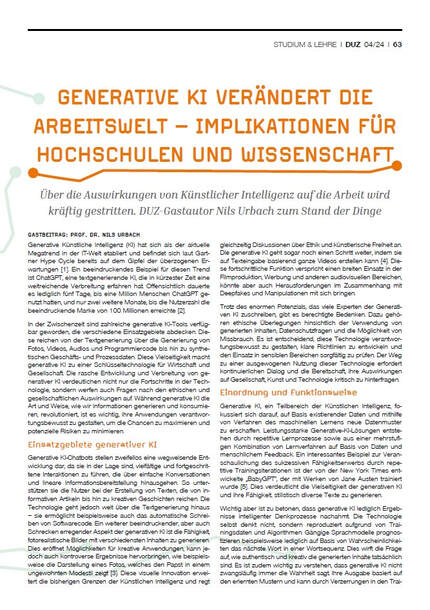
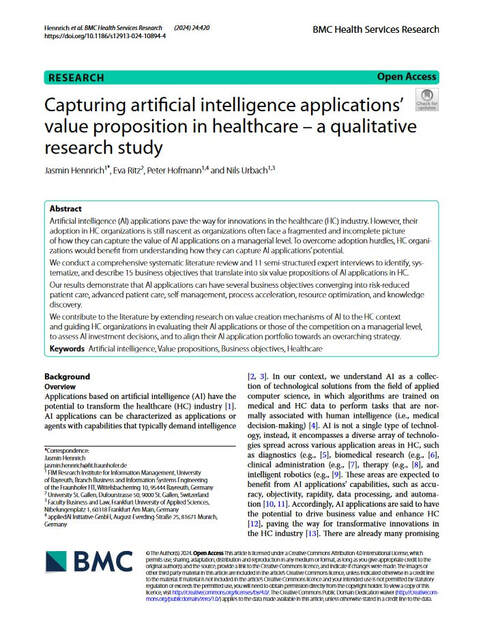
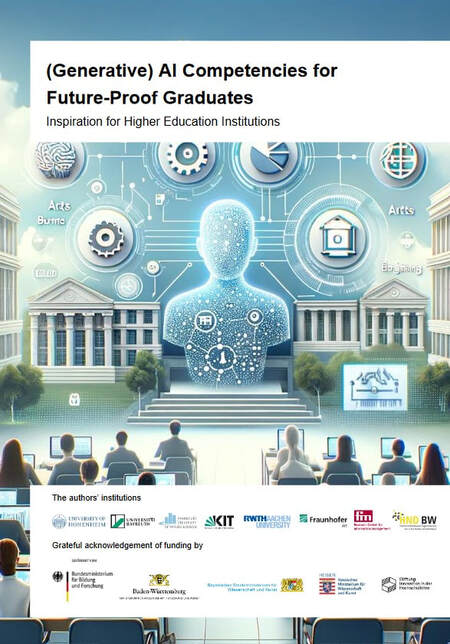
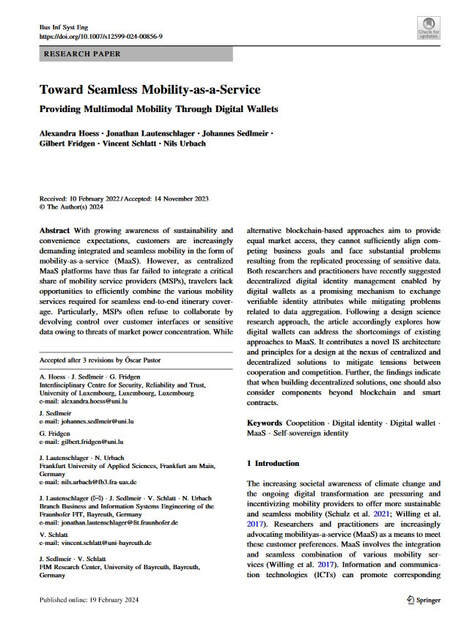
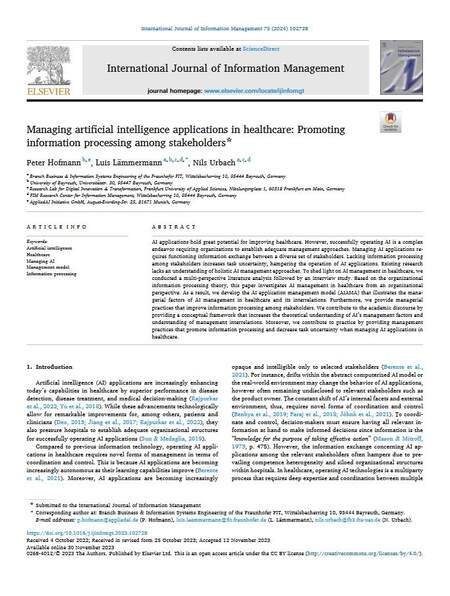
 RSS Feed
RSS Feed